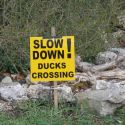Over by tube to King's Cross. I'm now used to not feeling too old if a young man offers me his seat. It's almost always an Asian boy, and part of the whole Asian culture of respect for older people. Today, though, a Chinese girl insists that J take her seat. I always wish I could sketch the random collection of six or seven people sitting opposite me on the tube - such an amazing cross-section of the very multicultural city that London is - bless them all. Today there is a girl wearing rhinestone slippers and ring with a (presumably fake) pearl the size of a marshmallow.
At the British Library we see an exhibit on the development of the English language. There are 400 million people with English as a first language, but 1.4 billion for whom it is the second language. Does that include those for whom it is 3rd or 4th? We've noticed in the winter that it is many people's second language. When a Norwegian speaks to a Greek Cypriot, it's almost always in English. Or as one Dutchman said, "Of course I speak English - who speaks Dutch?" The exhibit does contain some of the earliest works in English, I'm more interested in some of the other aspects. There are maps showing how the waves of immigration supplanted the native Celtic, especially the early Scandinavian influences. Both Kent and the Isle of Wight, homes of my great great great grandparents, had early Jutish settlements. For example Rolvenden, home of the Kentish ancestors, takes the "den" in its name from the Jutish for swine pasture. Thus also Benenden and Tenterden in the same area. It seems pretty likely that some of the untraceable ancestors were Jutes. There are also tapes to listen to with different accents - such as recreations of the Shakespearian period - and different slang. Thieves' argot and gay slang - the latter the origin of the term "naff". Before leaving I read the sample passage to add my own accent to the study.
